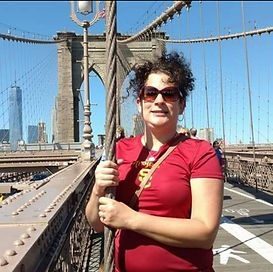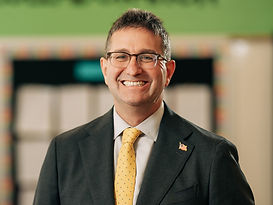GUEST COLUMN.
CONFRONTING A CHILD WELFARE CRISIS
By R. Kent Nowviskie, Deputy Commissioner for Policy and Programs, Bureau of Family Assistance, West Virginia Department of Human Services

Less than a day’s drive from 75% of America’s population lies a small state whose rugged, rolling hills are blanketed by deep forests and crisscrossed by rushing mountain streams. The pride that many West Virginians have for the natural grandeur of our hilly home belies a history of industrial boom and bust cycles driven by the state’s historically resource extraction-focused economy.
McDowell County, the heart of the state’s southern coalfield region, once produced more coal than any other county in the nation. By 1961, the economic picture had reached the point where an unemployed coal miner in McDowell County was the first person in the U.S. to be issued Food Stamps. Decades later, nearly 40% of McDowell County’s residents rely on SNAP benefits to help put food on the table.
While West Virginia is working overtime to reshape its economy in the face of 21st century realities, the ongoing decline of the coal industry, exacerbated by the deeply rural nature of the state, has led to this tragically lingering issue of generational poverty. West Virginia now has one of the lowest workforce participation rates in the country.
Poverty can lead to despair, and despair can lead to even worse. The opioid epidemic hit West Virginia with a vengeance in the 21st century. Centers for Disease Control statistics indicate that the state leads the nation in opioid-related overdose deaths. This epidemic of addiction, in turn, has led to a child welfare crisis that is also of epidemic proportions, with the state’s child welfare system likewise leading the nation in the rate of child removals from parental custody.
These statistics are a tough blow to the pride we West Virginians have for our home state, but with true Appalachian grit, we are determined to confront them. A recognition of the scale of the child welfare crisis and the need to address it has taken deep root over the past decade or so. Policy makers, advocates, providers, and communities across the state have rallied to find solutions.
Slowly but increasingly has come the recognition that to truly address the problem, we need to move upstream of the child welfare system itself by working to prevent families from falling into the types of crisis situations that may lead to the abuse and neglect that necessitate Child Protective Services involvement in the first place.
Key to this effort was a resource that went largely unrecognized for several decades. Since the late 1990s, the State provided a small amount of funding to a handful of community-based Family Resource Centers. These centers, which are operated by locally based non-profit organizations, are designed to be welcoming places in the community where families in need can turn for help of all kinds, whether that be assistance with economic and concrete needs, such as food or clothing, or services like respite care, parenting education, and child playgroups.
Before 2022, there were 24 of these centers scattered across 22 of the state’s 55 counties, funded in small amounts drawn almost entirely from the State’s allocation of federal Community Based Child Abuse Prevention (CBCAP) funding. Beginning in 2022, however, the West Virginia Department of Health and Human Resources (now the Department of Human Services), recognized the key role these centers play in the state’s Primary Prevention efforts and undertook a statewide expansion.
In consultation with its federal partners at various agencies, the Department began braiding funding from the Temporary Assistance for Needy Families (TANF) program, Title IV-B funding, CBCAP, and a state special revenue account called the West Virginia Children’s Trust Fund to increase the amount of funding available to each center to $250,000 annually. While not a huge amount of money for many states, it can go a long way in West Virginia and certainly represented a significant increase over the centers’ previous funding levels.
We rebranded the Family Resource Centers as Family Support Centers (FSCs) to foster a more holistic view of the kind of wraparound supports these centers provide to families in need. Simultaneously, the announcement went out that applications would be accepted for the institution of at least one center in every county. In the first year, 16 new centers came on board. In the 2023 grant cycle, we were thrilled to see 56 centers being stood up across 53 of our 55 counties. Jackson and Roane, we’re coming for you.
The expansion of these centers has opened other opportunities for collaboration and additional funding. The West Virginia Supreme Court has initiated a Parent Resource Navigator pilot program at eight of the centers, with the aim of providing a skilled point of contact for judicially-involved families to obtain needed supports that can help maintain or reunify the family.
Work is also underway to help the centers diversify their funding through support from a variety of partners, including Medicaid Managed Care Organizations, private foundation funding, and enhancement of their ability to provide services that would allow them to be reimbursed with Title IV-E Clearinghouse funds.
Creative funding solutions like the approach we’ve taken for the FSCs are a huge step in the right direction, but West Virginia clearly has much work left to do to reach our vision of a state where every family, no matter what challenges they may have faced, can sing the refrain from our state song (no, the other one):
Is it any wonder then that my heart with rapture thrills
As I stand once more with loved ones on those West Virginia Hills?
The contents of this guest column are those of the author and not necessarily those of Barrett and Greene, Inc.
#StateandLocalManagement #StateandLocalHumanServices #StateChildProtectiveServices #StateChildWelfareManagement #WestVirginiaHumanServices #WestVirginiaChildProtectiveServices #WestVirginiaOpioidOverdoseDeath #WestVirginia #CommunityBasedChildAbusePrevention #WestVirginiaFamilySupportCenters #McDowellCountyWV #WVCommunityBasedFamilyResourceCenters #WVParentResourceNavigatorPilot #WVFamilySupportExpansion #WestVirginiaChildServicesManagement



































































































